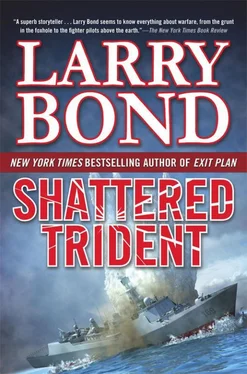“Insurance rates are already rising, although so far only for ships headed for the new war zone. And within the last hour, Lloyd’s has announced it will no longer issue insurance for Chinese-owned or -flagged ships.
“The belligerents’ goal is obvious: to starve the world’s largest nation and fastest-growing economy of oil. Rumors of other measures, including cyber attacks against Chinese interests and sabotage of Chinese refineries, are circulating, but have not been confirmed.”
The Lloyd’s of London logo was replaced by shots of Chinese warships steaming in formation. “Although called ‘terrorism’ by the Chinese, no known terrorist group has the resources to operate even a single submarine, and naval experts agree that an attack on this scale would require several vessels. The U.S. Navy refused to speculate on the identity of the mystery subs, and categorically denied making any attacks. They would neither confirm nor deny the presence of U.S. submarines in the South China Sea. The White House is preparing a statement for release later in the day.”
The picture shifted back to the stricken tanker. “In the case of Hai Tun Zuo, the crew was able to send a distress call, and because her emergency beacon was activated, rescuers were able to arrive relatively quickly.” The camera panned over to a helicopter hovering while a sling was lowered to a bright orange lifeboat.
“Most of the twenty-three-man crew were rescued, but three are known dead and another five are still missing. Pushed by the prevailing winds and ocean currents, the slick is expected to arrive at the Leizhou Peninsula in a day or two.
“As of this morning, the Chinese are losing a war with a phantom submarine fleet. It remains to be seen if they can stop or even identify their enemy. Please stay tuned for further developments in this fast-moving crisis. A list of all the vessels attacked is available at our Web site.”
31 August 2016
0900 Local Time
By Water
Halifax, Nova Scotia
Mac had split off everything about the sinkings onto a new daughter blog. He’d also shelved all his projects in a desperate effort to keep up with the insane amount of traffic. It wasn’t the news of the sinkings themselves. There’d been eleven in the past twenty-four hours, and after the first three, he’d set up an online database to display what was reliably known: location, identity, casualties, and so forth.
He’d been very careful to post only official information, and that only after he’d thoroughly reviewed it. The Chinese government wasn’t obligated to tell the truth, after all.
War had not been declared, but truth had already become a casualty. His notoriety in the naval community was now working against him, as would-be contributors inundated him with rumors. Most were disappointed when they found out that their data was old, inaccurate, or just plain wrong, but they accepted it. Others were convinced of their information’s accuracy, gleaned from some “inside source” or “inspired deduction.” Those individuals would not take no for an answer, and accused him of being narrow-minded or biased, except for one person who accused him of being in the pay of the Chinese! Mac loved a good exchange of information via e-mails. These were nothing like a good exchange.
But he wouldn’t stop reading and answering his mail. There’d been a few gems. Reports of a fire at a Chinese shipyard had been confirmed indirectly by the local media. His correspondent at Lloyd’s had allowed him to break the news about suspending insurance on Chinese tankers. Christine had appreciated his phone call on that one, although she’d acquired the same information only moments after he did.
Now he was calling her again. She’d given him her cell number, because she was so rarely in her office. “Mac!” She sounded rushed, but also pleased. “What news by the water?” she joked.
“It’s about Vinaship Sea .”
“That’s last week, Mac.” She sounded a little disappointed. “Have you seen the news today?”
“I won’t dignify that with an answer,” he huffed, but both knew he was joking. “There is a connection, Christine.”
“What? I may not be an expert, but Vinaship Sea was Vietnamese, and it wasn’t a tanker.”
“Bear with me for a moment.” Mac spoke quickly. “I’ve had several correspondents in Asia tell me about information that’s being leaked on Chinese blogs and Web sites, probably by a government office or the intelligence service. It claims to be a list of Vinaship Sea ’ s actual cargo—a surface-to-air missile battery, anti-aircraft guns, and ammunition, all destined for the Spratly Island chain.”
“That would explain the large explosion!” she remarked, almost happily.
“That part fits, but more important than that is her destination,” Mac explained. “I’ve plotted her course based on the new information, and it matches the location where she was sunk perfectly. The Vietnamese lied about her destination, and even filed false position reports. So if she was torpedoed, it had to be by someone who knew her true position.”
“And the Chinese knew,” she concluded. “Doesn’t this mean the Chinese are saying they sank the ship?”
“Indirectly, yes. The Spratly Islands are contested by Vietnam and China, among others. If Vietnam was secretly moving arms to the area, China may have decided to stop them just as secretly. And now they want other people to know.”
“So the tanker sinkings are payback by Vietnam?” She sounded skeptical. “That’s a lot of revenge for losing one ship.”
“And it’s also a lot more ships than the Vietnamese Navy could possibly sink. They only have three diesel-electric submarines. We did the math. You need a lot more than three.”
“So probably the Vietnamese and almost certainly some other navy are trying to damage China’s economy by sinking tankers.” She paused, then said, “That’s not a real strong headline.”
“It’s more than you knew five minutes ago,” he countered. “How about, ‘A Secret International Conspiracy, Aligned Against China’?”
“That sounds much better. I’ll have to rush, but we can probably get this into the next hourly feed. Please send me what you’ve got. And I’ll make sure your name gets mentioned.”
He pressed a key. “You have it.”
31 August 2016
1155 Local Time
Pentagon City Metro Station
Arlington, Virginia
Senator Lowell Hardy stepped off the Yellow Line Metro train at the Pentagon City station and reluctantly took the escalator up to the street level. The thick heat of Washington in August poured down the angled steps, and Hardy took strength in the restaurant being close—just across the street and four blocks down.
He hadn’t picked Siné Irish Pub, although it was a good place to meet. Good faux-Irish food and decent Irish beer. Not too noisy to have a conversation, or too quiet to stand out.
He suppressed the last thought, but it was a mysterious message, after all. A fellow submariner and a friend of Jerry Mitchell’s wanted to meet. The matter was extremely urgent, and he had suggested noon at Siné. He hadn’t left a name, or number where he could be reached. Hardy wondered if he’d pick up the tab.
The message hadn’t mentioned red carnations, so Hardy had simply walked in, expecting to be met. Nobody came up to greet him, but there was a short line waiting to be seated, and he joined it. When it was his turn, he asked, “Reservation for Hardy, twelve o’clock?”
“Yes, sir,” the hostess answered brightly. “Your other party has already been seated.”
Читать дальше

![Никки Сикс - Героиновые дневники. Год из жизни павшей рок-звезды[The Heroin Diaries - A Year in the Life of a Shattered Rock Star]](/books/78612/nikki-siks-geroinovye-dnevniki-god-iz-zhizni-pavshej-rok-zvezdy-the-heroin-diaries-a-yea-thumb.webp)










